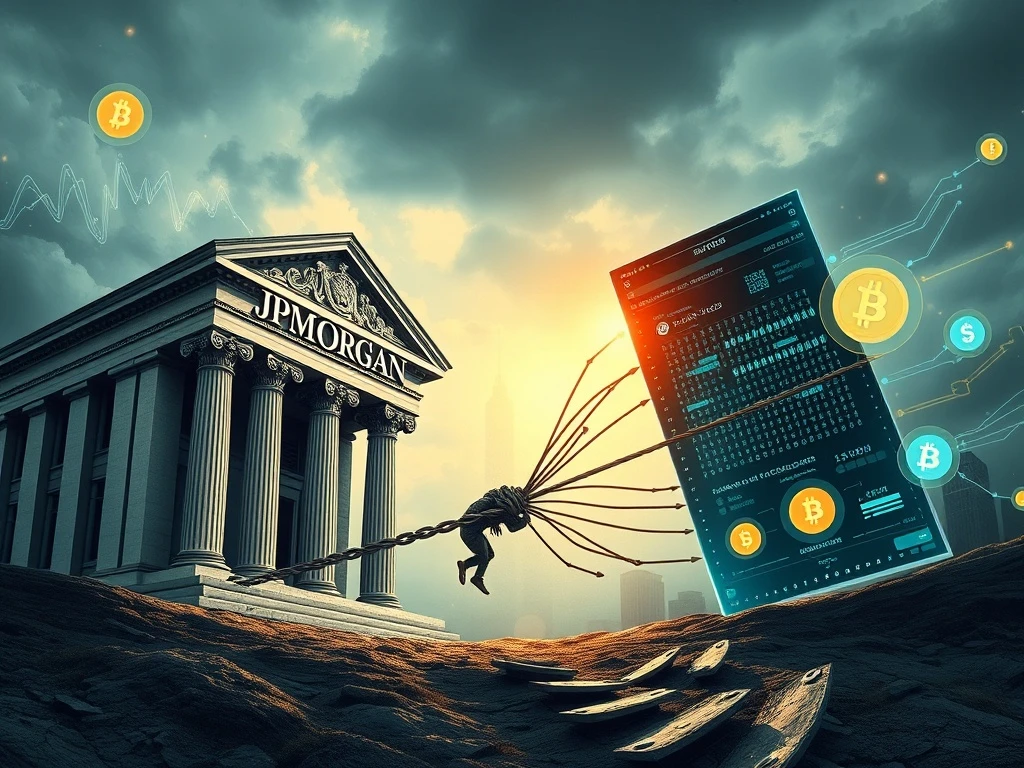Winklevoss JPMorgan Clash: Explosive Accusations Over Crypto Banking Chokehold

An explosive accusation has rocked the crypto world, setting traditional finance against the digital frontier. Tyler Winklevoss, co-founder of the prominent Gemini cryptocurrency exchange, has publicly accused banking giant JPMorgan Chase of a retaliatory move: halting Gemini’s re-onboarding as a banking client. This isn’t just a business dispute; it’s a battle over access, control, and the very future of crypto banking. The heart of the matter? JPMorgan’s controversial new policy demanding fees for fintech companies accessing customer bank data. Winklevoss claims this policy, and the alleged retaliation, is part of a broader, more insidious strategy he calls “Operation ChokePoint 2.0.”
The Core of the Conflict: Unpacking JPMorgan’s Fintech Data Fees
At the center of this brewing storm is JPMorgan’s decision to levy fees on fintech firms that access customer bank data. On July 19, 2025, JPMorgan announced this policy, immediately drawing criticism from the fintech and crypto communities. Tyler Winklevoss was among the first and most vocal critics, warning that such a policy could severely cripple third-party platforms. These platforms are crucial for users to connect their traditional bank accounts to crypto exchanges, forming a vital bridge between legacy finance and the digital asset space. He argued that these fintech data fees don’t just add costs; they fundamentally undermine consumer freedom by complicating access to essential services like Plaid, which facilitates these bank-to-crypto connections.
For crypto firms, access to traditional banking services isn’t a luxury; it’s a necessity. Without reliable banking partners, exchanges struggle to process deposits and withdrawals, pay employees, and manage operational expenses. This makes JPMorgan’s alleged move particularly impactful, as it threatens to further isolate digital asset firms from the mainstream financial system.
Is This ‘Operation ChokePoint 2.0’ for Crypto Banking?
The term “Operation ChokePoint 2.0” resonates deeply within the crypto community, evoking memories of a controversial U.S. government initiative from 2013-2017 that aimed to reduce fraud by pressuring banks to cut ties with businesses deemed high-risk. While the original program targeted industries like payday lenders and firearms dealers, the crypto community now uses “ChokePoint 2.0” to describe perceived coordinated efforts by banks and regulators to restrict services for digital asset firms.
Winklevoss’s public post on X (formerly Twitter) explicitly framed JPMorgan’s actions within this narrative, suggesting a deliberate attempt to suppress the crypto industry. He believes that by imposing prohibitive fintech data fees and allegedly halting banking ties, JPMorgan is engaging in tactics designed to ‘choke off’ crypto companies from essential financial infrastructure. This perspective highlights a fundamental tension:
- Legacy Institutions vs. Innovation: Are traditional banks leveraging their market dominance to stifle emerging competitors in fintech and crypto?
- Regulatory Scrutiny: Is increased regulatory pressure on banks indirectly leading to de-risking strategies that disproportionately affect crypto firms?
- Consumer Choice: Do these actions limit consumer access to digital asset services, thereby impacting financial freedom?
Over the past two years, numerous crypto platforms have indeed struggled to maintain banking relationships amidst heightened regulatory scrutiny. While the Federal Deposit Insurance Corporation (FDIC) has acknowledged concerns about targeted practices, it has not directly implicated JPMorgan in such a coordinated effort.
The Impact on Gemini Exchange and the Broader Digital Asset Ecosystem
The alleged suspension of banking ties with Gemini Exchange by JPMorgan sends a chilling message across the entire digital asset ecosystem. Gemini, launched in 2015 by the Winklevoss twins, has consistently positioned itself as a regulated and compliant cryptocurrency exchange, striving to bridge the gap between traditional finance and crypto. If even a firm like Gemini, with its established regulatory posture, faces such hurdles, it raises significant questions about the viability of operating a crypto business in the U.S. financial landscape.
The implications extend beyond just Gemini:
- Reduced Market Access: Fewer banking partners mean fewer options for users to onboard fiat currency into crypto, potentially slowing mainstream adoption.
- Increased Operational Costs: Crypto firms may be forced to seek out more expensive or less reliable banking solutions, impacting their profitability and sustainability.
- Innovation Stifled: Uncertainty around banking access can deter new startups and limit the growth of existing ones, hindering innovation in the fintech and crypto sectors.
The controversy underscores the ongoing struggle for crypto firms to gain legitimate and stable access to essential financial services, a cornerstone for any industry’s growth and maturity.
Navigating the Regulatory Minefield: What This Means for Winklevoss JPMorgan
The Winklevoss JPMorgan dispute unfolds against a backdrop of rapidly shifting political and regulatory dynamics in the United States. While the Biden administration has maintained a mixed regulatory approach, often characterized by caution, there are clear signs of growing political support for crypto on Capitol Hill. The recent passage of a stablecoin regulation law by the U.S. House, subsequently signed by President Donald Trump, signals a potential shift towards more accommodating policies for digital assets.
This evolving landscape adds another layer of complexity to the standoff. If JPMorgan’s policies are widely perceived as discriminatory or anti-competitive, they could fuel calls for more explicit regulatory reforms aimed at ensuring equitable access to financial services for crypto and fintech companies. Conversely, JPMorgan could argue that its actions are purely aligned with broader risk management protocols and compliance efforts in a highly scrutinized sector.
This situation highlights a pivotal moment for crypto banking in the United States. The resolution of this high-profile dispute, whether through public pressure, regulatory intervention, or private negotiation, could set a significant precedent for how traditional financial institutions and the burgeoning digital asset industry interact moving forward. It underscores the ongoing tension between established financial powerhouses and the disruptive force of decentralized finance.
Conclusion
The accusation by Tyler Winklevoss against JPMorgan Chase over alleged retaliatory banking halts and controversial fintech data fees is more than just a corporate spat; it’s a microcosm of the larger struggle for legitimacy and integration faced by the crypto industry. The specter of “Operation ChokePoint 2.0” looms large, reminding the crypto community of past battles for financial access. As this situation unfolds, it will undoubtedly influence the future regulatory landscape and the operational viability of crypto firms in the U.S., shaping the very pathways through which digital assets interact with the traditional financial system. The outcome will be closely watched by innovators, regulators, and consumers alike, as it could determine the pace of financial innovation and the degree of freedom consumers have in managing their digital assets.
Frequently Asked Questions (FAQs)
Q1: What is the core accusation Tyler Winklevoss has made against JPMorgan?
Tyler Winklevoss, co-founder of Gemini, accuses JPMorgan Chase of retaliating against his firm by halting its re-onboarding as a banking client. This alleged retaliation stems from Winklevoss’s criticism of JPMorgan’s new policy requiring fintech companies to pay fees for accessing customer bank data.
Q2: What are ‘Fintech Data Fees’ and why are they controversial?
Fintech Data Fees are charges imposed by traditional banks, like JPMorgan, on third-party financial technology companies (fintechs) for accessing customer bank data. They are controversial because critics, including Winklevoss, argue they stifle competition, increase costs for consumers, and could create barriers for services like linking bank accounts to crypto exchanges.
Q3: What does ‘Operation ChokePoint 2.0’ refer to in this context?
‘Operation ChokePoint 2.0’ is a term used by the crypto community to describe perceived coordinated efforts by traditional banks and regulators to restrict or deny banking services to digital asset firms. Winklevoss alleges JPMorgan’s actions are part of such an effort, making it difficult for crypto companies to operate.
Q4: How does this dispute impact Gemini Exchange?
If JPMorgan has indeed halted banking ties, it could significantly impact Gemini Exchange’s operations by complicating customer deposits and withdrawals, increasing operational costs, and potentially limiting its ability to expand services. It also sends a negative signal about banking access for compliant crypto firms.
Q5: What are the broader implications of the Winklevoss JPMorgan conflict for the crypto industry?
The conflict highlights ongoing challenges for crypto firms to secure stable banking relationships. It could accelerate calls for regulatory reforms to ensure equitable access to financial services for digital asset companies, and it underscores the tension between traditional finance and emerging fintech/crypto sectors, potentially affecting market access and innovation across the industry.
Q6: Has the FDIC or any other regulator commented on JPMorgan’s actions?
While the Federal Deposit Insurance Corporation (FDIC) has acknowledged general concerns about targeted practices against certain industries, it has not directly implicated JPMorgan in specific discriminatory actions related to this dispute.






